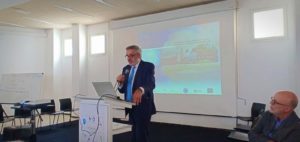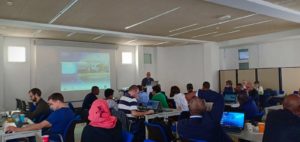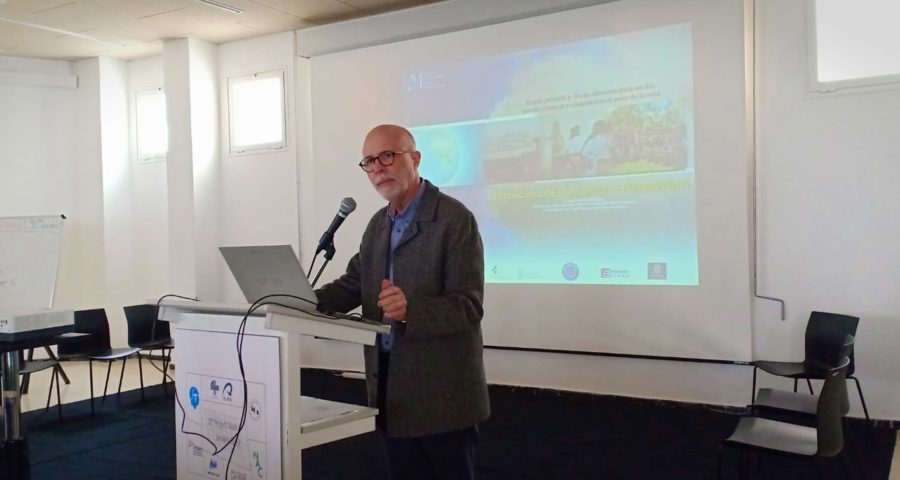During the last day of the 30th NA-MIC Project Week, the participants of this international meeting of working teams for accessible medical technology held in Gran Canaria received the visit of two exceptional speakers, Drs. Luis López and Lluís Serra Majem.
Dr. Luis López, Canary Islands International Cooperation Award, Director of cooperation of the Canarian Health Service (SCS) and member of the University Institute of Biomedical and Sanitary Research (IUIBS) of the Universidad de las Palmas of Gran Canaria ( ULPGC), participated in the 30th NA-MIC Project Week Canary 2019 with an exhibition of work done in Mozambique to promote the establishment of university studies in medicine and the formation of resident specialists. It was presented by Professor Lluís Serra, professor of the ULPGC and director of the IUIBS.
The specialized training program of medical students of the University of Zambezi directed by Luis López has been progressive. The intervention of the ULPGC in Mozambique began in 2011 in the Faculty of Medicine, and has been expanded since the formation of students of second cycle in this faculty, to the training of doctors specialists in the African country. Between 2015 and 2017 have graduated 110 specialists who join the existing specialists so far for the area of Tete, with about 2 million inhabitants.
 |
 |
Sustainable training and technology
The connection of the ULPGC with Africa also materializes in the project MACbioIDi ' Promoting the cohesion of the RUPs Macaronesian through a common ICT platform for the R & D + I biomedical ', which is coordinated from the academic institution through the Institute University of Biomedical and sanitary research, with the director of the medical and Audiovisual Technology Group of IUIBS, Juan Ruiz Alzola, as principal investigator.
The end, explains Professor Alzola, is ' to promote a node through which technologies, knowledge and people flow, which is enormously multicultural and varied. This is how international collaborations are established, which also generate relationships of trust and business possibilities. It is necessary to meet the needs and companies that will develop the final solutions of each country.
Universities what we do is we demonstrate proof of concept. To be able to play this role of technological channel and technology adapter, very oriented to Africa, is also an excellent opportunity for Spain and, in particular, for the Canary Islands '.
For the MACbioIDi project, training is a fundamental aspect, both in terms of the use of technology to train students and physicians, as well as the training of biomedical engineers. Sustainability, training and open technology tools have been some lines of work developed last week in the 30th NA-MIC Project Week 2019 held in Gran Canaria. The meeting promoted by the National Alliance for Medical Image Computing (NAMIC) alternates annually a European site with its headquarters at the Institute of Technology of Massachusetts (MIT), and since 2018 began to realize the European event in ULPGC during its 28th edition, repeating this month of January 2019 in the academic institution of Gran Canaria with the 30th edition.
In this 30th NA-MIC Project Week participated researchers and partners of the MACbioIDi Project, who work in a great international collaboration together with other African, European and American professionals with the aspiration to develop training Specialized and inclusive, sustainable and advanced technology that can be introduced and used in the participating territories, paying attention to their social and business transfer.
They are beneficiaries of the project La ULPGC (as Coordinator), ULL, IAC, ITC, Institute of Interactive Technologies M-ITI (Madeira), and Hospital do Divino Espirito Santo (Azores). The celebration of this event has had the collaboration of the Canarian Health Service, through the health ministry, and Proexca from the Ministry of Economy, Industry, commerce and knowledge of the Government of the Canary Islands, as well as Casa Africa and the museum Elder of the science and technology of the palms of Gran Canaria.


